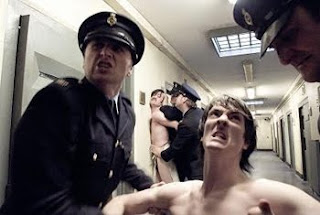 I love watching movies about the hypocrisy of the aristocracy in social gatherings. In Robert Altman’s brilliant “Gosford Park” we get to sneak into a lavish dinner filled with colorful and eccentric characters (who get involved in a mysterious murder case); there is the rich tenant having an affair with the maid, the wife who mocks and despises him, the sister complaining about everything in the house (including the marmalade and, especially, her allowance) and many more, which include unusual guests like an actor pretending to be the assistant of a clueless American producer.
I love watching movies about the hypocrisy of the aristocracy in social gatherings. In Robert Altman’s brilliant “Gosford Park” we get to sneak into a lavish dinner filled with colorful and eccentric characters (who get involved in a mysterious murder case); there is the rich tenant having an affair with the maid, the wife who mocks and despises him, the sister complaining about everything in the house (including the marmalade and, especially, her allowance) and many more, which include unusual guests like an actor pretending to be the assistant of a clueless American producer.“Gosford Park” features great performances from its amazing cast (a cast that features virtually every British performer, although the Harry Potter movies really have the distinction of featuring every English actor working nowadays). It’s really fascinating to see Altman juggle with so many stories and yet never lose focus of the big picture.
No one was better however, at poking fun of the Bourgeois like director Luis Buñuel with his two films, “The Exterminating Angel” and “The Discreet Charm of the Bourgeois”. Both are drenched in a surrealistic and morbid cloud that turn the whole affair into a black comedy of manners; “The Exterminating Angel” features the gathering of a wealthy group that through some strange force are compelled to stay in the house even after the evening is long over. They’re not trapped (the doors are wide open) but they simply cannot leave. It’s hard to unravel the meaning of the movie (even with some strange occurrences like the arrival of farm animals, which surely represent some kind of symbolism) but Buñuel keeps us involved up till the very ending, which seems appropriately weird in accordance to the past events. Buñuel made several movies in Mexico and “The Exterminating Angel” is one of his best (the most acclaimed of the era remains “Los Olvidados”, a potent social critique of the state of poverty in the country).
“The Discreet Charm of the Bourgeois” was made during his French period and also features a meeting between a group of aristocrats. This time dreams interweave with reality in a series of bizarre sequences. The film starts with the arrival of the friends of a rich couple at a lavish mansion; they were, through a misunderstanding, expected to arrive till the next day so nothing is ready. They all decide then to go to a fancy restaurant where they realize about the death of the owner and how their evening is interrupted by the funeral. They decide to leave. The movie follows this pattern over and over in sometimes hilarious results.
“The Discreet Charm of the Bourgeois” is a very strange film; it doesn’t have a linear narrative and loses itself in its self-indulgent fantasies. With that said, I have to admit it’s never boring and some sequences are very inspired in a surrealistic sense (I specially love the whole subplot with the priest who becomes a gardener and can finally avenge his parents murder, at the hand of his family gardener).
These movies take us to the slick world of the upper-class, and the social distinctions of the “upstairs-downstairs” set of values. They’re all wicked fun at the cost of the bourgeois.



